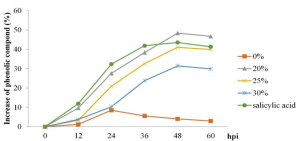A group from Faculty of Science and Technology, Thammasat University, Pathumtani, Thailand, etc. has reported that the beneficial effect of Bacillus to suppress phytopathogen is due to double-sided nature of its secondary metabolites.
https://www.ncbi.nlm.nih.gov/pmc/articles/PMC9986491/
It has been known that Bacillus exhibit potent antagonistic activity against phytopathogens through the secondary metabolites, i.e., lipopeptide biosurfactants such as iturin A and surfactin.
However, such antagonistic activity of Bacillus is not only due to the direct effect of biosurfactants but also due to boosting plant immunity by the biosurfactants. Salicylic acid (SA), jasmonic acid (JA), and ethylene (ET) are important hormonal signal molecules involved in biotic stress responses during plant–pathogen interactions.
In this work, it was shown that biosurfactant treatments elevated both salicylic acid and total phenolic content, with a faster rate, whereas total phenolic content in the control treatment (i.e., 0%) was only slightly increased.

efficacy of the Bacillus biosurfactant as the sole regulator at concentrations of 20%, 25%, and 30% v/v.
